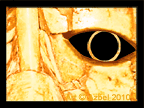A photograph released to Reuters on August 22, 2014 shows the remains of
an ancient Mayan city in Lagunita May 30, 2014. REUTERS/Research Center
of the Slovenian Academy of Sciences and Arts/Handout via Reuters
A photograph released to Reuters on August 22, 2014 shows a piece of a
stela at an Mayan city in Tamchen April 6, 2014. REUTERS/Research Center
of the Slovenian Academy of Sciences and Arts/Handout via Reuters
Ivan Sprajc, associate professor at the Research Center of the
Slovenian Academy of Sciences and Arts, said his team found the ancient
cities of Lagunita and Tamchen on the Yucatan peninsula in April by
examining aerial photographs of the region.
Sprajc said the two cities reached their heyday in the Late and Terminal Classic periods (600-1000 AD). At each site, researchers found palace-like buildings, pyramids and plazas. One of the pyramids is almost 20 metres high.
They also found a facade featuring a monster-mouth doorway, which probably marked one of the main entrances to the center of the city. Photographs from the sites showed stone pyramids jutting out from beneath dense foliage.
"The entrance apparently symbolizes the entrance to a cave and to the underworld ... Someone entering through this doorway would have entered sacred precincts," he told Reuters by telephone from Slovenia on Friday.
Sprajc said his team mapped 25-30 acres at each site, but the cities were probably larger. "We elaborated a map but only of the religious and administrative centers of the two sites," he said, "that's only like downtown."
His team has not yet excavated the sites.
"There are dozens of sites that I already have seen on the aerial photographs," he added, noting that additional discoveries depend on further funding.
Last summer, Sprajc discovered another ancient Mayan city, Chactun, 10 km north of Lagunita and 6 km northwest of Tamchen.
A photograph released to Reuters on August 22, 2014 shows the remains of an ancient Mayan city in Tamchen April 15, 2014. REUTERS/Research Center of the Slovenian Academy of Sciences and Arts/Handout via Reuters
A photograph released to Reuters on August 22, 2014 shows a chultun, an
underground chamber for the collection of rainwater inTamchen May 5,
2014. REUTERS/Research Center of the Slovenian Academy of Sciences and
Arts/Handout via Reuters
Sprajc said the two cities reached their heyday in the Late and Terminal Classic periods (600-1000 AD). At each site, researchers found palace-like buildings, pyramids and plazas. One of the pyramids is almost 20 metres high.
A photograph released to Reuters on August 22, 2014 shows a piece of a
stela from an ancient Mayan city in Lagunita May 17, 2014.
REUTERS/Research Center of the Slovenian Academy of Sciences and
Arts/Handout via Reuters
They also found a facade featuring a monster-mouth doorway, which probably marked one of the main entrances to the center of the city. Photographs from the sites showed stone pyramids jutting out from beneath dense foliage.
A photograph released to Reuters on August 22, 2014 shows a piece of an
altar from an ancient Mayan city in Lagunita May 18, 2014.
REUTERS/Research Center of the Slovenian Academy of Sciences and
Arts/Handout via Reuters
"The entrance apparently symbolizes the entrance to a cave and to the underworld ... Someone entering through this doorway would have entered sacred precincts," he told Reuters by telephone from Slovenia on Friday.
A photograph released to Reuters on August 22, 2014 shows a piece of a
stela from an ancient Mayan city in Lagunita May 18, 2014.
REUTERS/Research Center of the Slovenian Academy of Sciences and
Arts/Handout via Reuters
Sprajc said his team mapped 25-30 acres at each site, but the cities were probably larger. "We elaborated a map but only of the religious and administrative centers of the two sites," he said, "that's only like downtown."
A photograph released to Reuters on August 22, 2014 shows a piece of a
stela from an ancient Mayan city in Lagunita May 17, 2014.
REUTERS/Research Center of the Slovenian Academy of Sciences and
Arts/Handout via Reuters
His team has not yet excavated the sites.
"There are dozens of sites that I already have seen on the aerial photographs," he added, noting that additional discoveries depend on further funding.
A photograph released to Reuters on August 22, 2014 shows the remains of
an ancient Mayan city in Lagunita May 30, 2014. REUTERS/Research Center
of the Slovenian Academy of Sciences and Arts/Handout via Reuters
A photograph released to Reuters on August 22, 2014 shows a piece of a
stela from an ancient Mayan city in Lagunita May 17, 2014.
REUTERS/Research Center of the Slovenian Academy of Sciences and
Arts/Handout via Reuters
A photograph released to Reuters on August 22, 2014 shows the remains of an ancient Mayan city in Tamchen April 15, 2014. REUTERS/Research Center of the Slovenian Academy of Sciences and Arts/Handout via Reuters
photos: Reuters
source:http://www.stcatharinesstandard.ca





























































































































































































































0 comments:
Publicar un comentario